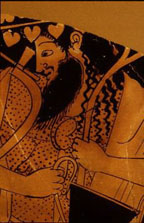 |
|
David Stuttard’s translation and direction gave a picture of a slightly guilty Dionysus at the end of the play, realising that his revenge had gone too far. This alternative analysis of the original text presented a powerful and even more moving ending as Dionysus realises that his is half mortal as well as half god and it is his own family that he has destroyed.
His choice of Tamsin Shasha in the role was a very effective way of showing Dionysus’ neutrality of gender and allowed him to be powerful as well as feminine. The passion of Tamsin Shasha’s performance engaged the audience from the moment the play began, and her energy throughout the play drove it relentlessly to its tragically inevitable conclusion.
The choreography and the imaginative use of limited stage space focused the audience’s attention on the powerful emotions in the play. David Stuttard’s use of a cage-like set added to the claustrophobia and provided a visual symbol of irrevocable fate and the women’s animal-like madness. It also symbolised the caged Dionysus-like facet of human character which Pentheus denies himself, and which of course, in the end, must explode out hence his savage death ripped apart at the hands of the Bacchae.
The small cast added to the intimacy and simplicity of the setting, and reflected the original way in which the play would have been performed. The use of Chorus members as messengers and other minor parts associated with news of the Bacchic rites gave a powerful feeling of Dionysus’ overwhelming power, and also helped show the confusion in Pentheus’ mind.
The translation of the play into more modern and colloquial English brought the play much closer to the heart and helped to show that many of the ideas in the play are still applicable to modern day life. This, coupled with the intense emotion of the characters, meant that many were close to tears in the final recognition scene as Agavae realised the immensity of what she had done unknowingly.
The end of the play was so traumatic that it left many of the audience stunned and there was a long pause before the strong applause as many felt that clapping was too happy for such a play.
This powerful and evocative journey through the emotions brought to life once more in a superb and modern-day adaptation of Greek Theatre. Stitched into the fabric and the language were echoes of the Golden Age of Greek Tragedy, and the tragedies that face us all in life. Stunned, shocked and mesmerised, we had a fantastic night.
|
Helen McCabe |
 Pentheus is ripped apart by the Bacchae. |
Kathryn Lund |